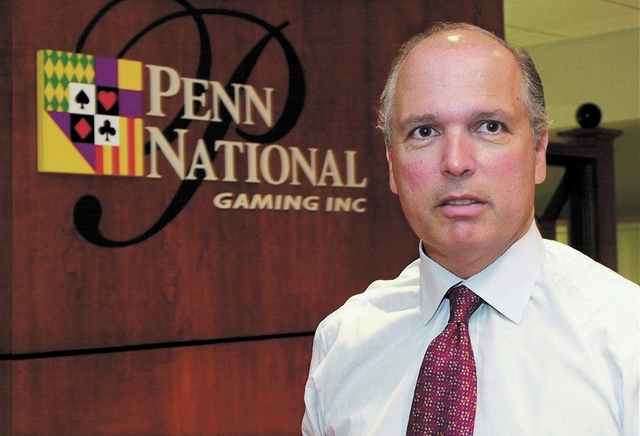Foreign deals can include risks

Payoffs to government officials typically don’t show up on the balance sheets of U.S. gaming companies.
That the accounting practice is commonplace in some countries was a reason Penn National Gaming rejected expansion into Asia.
In a speech Nov. 8 to the Baron Investment Conference in New York City, Penn National Chairman Peter Carlino said the regional casino operator explored a joint venture in an unnamed country. The idea was quashed when Penn discovered its potential partner had budgeted payoffs for border guards.
Carlino said efforts by the Justice Department and the Securities and Exchange Commission to enforce the Foreign Corrupt Practices Act — a U.S. law that prohibits paying bribes in other countries — make American businesses skittish about investing in emerging international markets.
“There’s a little bit of overzealousness in this,” Carlino said, according to cnbc.com’s coverage of the speech. “Those are limitations that American companies face that others don’t.”
His concern is not far-fetched. Other Las Vegas casino companies have run afoul of the law. Las Vegas Sands Corp. is the subject of a continuing government investigation that it made improper payments in Macau. A donation by Wynn Resorts Ltd. of $135 million to the University of Macau Development Foundation in 2011 is under scrutiny by federal prosecutors.
Carlino drew laughs from the Baron’s audience when he said Penn would actually be willing to play “if that’s the game.”
Frankly, his comments were refreshing and honest. To be competitive overseas, U.S. companies sometimes have to play by rules that only seem foreign to regulators in Washington, D.C.
Despite the recent vote to approve seven Las Vegas-style casinos in New York, gaming expansion in the U.S. has slowed. Massachusetts legalized casinos in 2010, but the first gaming hall may not open there until 2016 or 2017. The odds are stacked against casino expansion in other large states, such as Florida and Texas.
Macau and Singapore, meanwhile, provide multibillion-dollar case studies for gaming growth in Asia.
Macau produced a record $38 billion in gaming revenue in 2012. The Chinese enclave’s casinos have already collected $37.13 billion through October this year. In Singapore, analysts predict the island nation’s two casinos could top $6 billion in annual gaming revenue, eclipsing Las Vegas as the world’s No. 2 market.
Japan, South Korea, Vietnam, Taiwan and other countries are on the cusp of allowing in U.S. casino operators.
The gaming industry’s biggest players are eyeing the markets, hoping their revenue potential mirrors Macau and Singapore.
Carlino told the Baron’s crowd he wasn’t so sure.
“Finding the right opportunity, although we look and I trust we will, is tough,” Carlino said. “The pickings are slim.”
Penn National spokesman Joe Jaffoni wouldn’t elaborate on Carlino’s speech or identify the prospective partner with a budget for bribes.
“He was just pointing out that there is a different way of doing business and that American companies need to be aware of that to avoid problems,” Jaffoni said in an email.
Carlino’s bigger bombshell was in expressing Penn’s interest in venturing outside North America.
The company operates 29 casinos and racetracks in 19 states and the Canadian province of Ontario. Penn recently spun off 21 of the company’s properties — including M Resort — as Gaming and Leisure Properties, a publicly traded real estate investment trust.
Carlino is still Penn’s chairman, but he has turned over the CEO duties to Penn President Tim Wilmott. Carlino is chairman and CEO of Gaming and Leisure Properties, which leases the casinos back to Penn National. By law, real estate investment trusts don’t pay federal income taxes, but are required to distribute at least 90 percent of taxable earnings to shareholders.
Penn National is the domestic casino industry’s guinea pig. If the real estate investment trust is profitable, other casino companies may try it.
But Penn National’s stock price fell 77 percent the day the spinoff went live. Analysts said the real estate investment trust caused investors to undervalue Penn compared with other regional operators.
“The discount stems from Penn now being an operating company and its peers owning the land underneath their properties,” Brean Capital gaming analyst Justin Sebastiano told investors. “Given that the real estate of most regional casinos holds little value by themselves, we believe Penn’s valuation is being unjustly penalized.”
Some on Wall Street believe Gaming and Leisure Properties will spend $500 million or more on acquisitions next year, possibly targeting smaller regional casino operators.
Penn National has typically focused on U.S. expansion. The company is redeveloping its two Ohio racetracks as slot machine-only casinos and is bidding on available gaming licenses in Massachusetts and Maryland.
Atlantic City is not on Carlino’s shopping list. He told the Baron’s conference that Atlantic City is “O-V-E-R” in its ability to compete in the northeast.
For lack of a better word, moving Penn National beyond its core business seems, well, foreign.
Penn’s chief rival in regional gaming, Pinnacle Entertainment, owns about 20 percent of Asian Coast Development Ltd., a Canadian company building a large resort-gaming complex in Vietnam.
Macau’s and Singapore’s gaming licenses are locked down. Casino activity in Japan and South Korea are tentative and await government action. Japan, which views gaming taxes as a way to fund the infrastructure needs associated with the 2020 Summer Olympics in Tokyo, could produce $6 billion in annual revenue from a single casino.
Japan seems more geared toward the likes of Las Vegas Sands, Wynn Resorts, MGM Resorts International or Caesars Entertainment Corp., rather than Penn National.
Howard Stutz’s Inside Gaming column appears Sundays. He can be reached at hstutz@reviewjournal.com or 702-477-3871. Follow @howardstutz on Twitter.